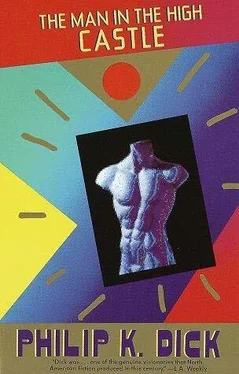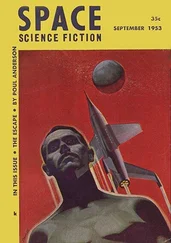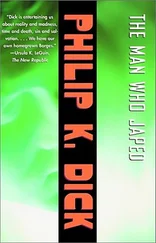“Go ahead,” Mrs. Abendsen said. Her tone, Juliana thought, had a more alert, sharpened quality now.
After Juliana had read the judgment of the Forty-third hexagram, with the word danger in it, there was silence. Mrs. Abendsen said nothing and Juliana said nothing.
“Well, we’ll look forward to seeing you tomorrow, then,” Mrs. Abendsen said finally. “And would you give me your name, please?”
“Juliana Frink,” she said. “Thank you very much, Mrs. Abendsen.” The operator, now, had broken in to clamor about the time being up, so Juliana hung up the phone, collected her purse and the volumes of the oracle, left the phone booth and walked over to the drugstore fountain.
After she had ordered a sandwich and a Coke, and was sitting smoking a cigarette and resting, she realized with a rush of unbelieving horror that she had said nothing to Mrs. Abendsen about the Gestapo man or the SD man or whatever he was, that Joe Cinnadella she had left in the hotel room in Denver. She simply could not believe it. I forgot! she said to herself. It dropped completely out of my mind. How could that be? I must be nuts; I must be terribly sick and stupid and nuts.
For a moment she fumbled with her purse, trying to find change for another call. No, she decided as she started up from the stool. I can’t call them again tonight; I’ll let it go—it’s just too goddam late. I’m tired and they’re probably asleep by now.
She ate her chicken salad sandwich, drank her Coke, and then she drove to the nearest motel, rented a room and crept tremblingly into bed.
Mr. Nobusuke Tagomi thought, There is no answer. No understanding. Even in the oracle. Yet I must go on living day to day anyhow.
I will go and find the small. Live unseen, at any rate. Until some later time when—
In any case he said good-bye to his wife and left his house. But today he did not go to the Nippon Times Building as usual. What about relaxation? Drive to Golden Gate Park with its zoo and fish? Visit where things who cannot think nonetheless enjoy.
Time. It is a long trip for the pedecab, and it gives me more time to perceive. If that can be said.
But trees and zoo are not personal. I must clutch at human life. This had made me into a child, although that could be good. I could make it good.
The pedecab driver pumped along Kearny Street, toward downtown San Francisco. Ride cable car, Mr. Tagomi thought suddenly. Happiness in clearest, almost tear-jerking voyage, object that should have vanished in 1900 but is oddly yet extant.
He dismissed the pedecab, walked along the sidewalk toward the nearest cable tracks.
Perhaps, he thought, I can never go back to the Nippon Times Building, with its stink of death. My career over, but just as well. A replacement can be found by the Board of Trade Mission Activities. But Tagomi still walks, exists, recalling every detail. So nothing is accomplished.
In any case the war, Operation Dandelion, will sweep us all away. No matter what we are doing at the time. Our enemy, alongside whom we fought in the last war. What good did it do us? We should have fought them, possibly. Or permitted them to lose, assisted their enemies, the United States, Britain, Russia.
Hopeless wherever one looks.
The oracle enigmatic. Perhaps it has withdrawn from the world of man in sorrow. The sages leaving.
We have entered a Moment when we are alone. We cannot get assistance, as before. Well, Mr. Tagomi thought, perhaps that too is good. Or can be made good. One must still try to find the Way.
He boarded the California Street cable car, rode all the way to the end of the line. He even hopped out and assisted in turning the cable car around on its wooden turntable. That, of all experiences in the city, had the most meaning for him, customarily. Now the effect languished; he felt the void even more acutely, due to vitiation here of all places.
Naturally he rode back. But… a formality, he realized as he watched the streets, buildings, traffic pass in reverse of before.
Near Stockton he rose to get off. But at the stop, when he started to descend, the conductor hailed him. “Your briefcase, sir.”
“Thank you.” He had left it on the cable car. Reaching up he accepted it, then bowed as the cable car clanged into motion. Very valuable briefcase contents, he thought. Priceless Colt .44 collector’s item carried within. Now kept within easy reach constantly, in case vengeful hooligans of SD should try to repay me as individual. One never knows. And yet—Mr. Tagomi felt that this new procedure, despite all that had occurred, was neurotic. I should not yield to it, he told himself once again as he walked along carrying the briefcase. Compulsion-obsession-phobia. But he could not free himself.
It in my grip, I in its, he thought.
Have I then lost my delighted attitude? he asked himself. Is all instinct perverted from the memory of what I did? All collecting damaged, not merely attitude toward this one item? Mainstay of my life… area, alas, where I dwelt with such relish.
Hailing a pedecab, he directed the driver to Montgomery Street and Robert Childan’s shop. Let us find out. One thread left, connecting me with the voluntary. I possibly could manage my anxious proclivities by a ruse: trade the gun in on more historicity sanctioned item. This gun, for me, has too much subjective history… all of the wrong kind. But that ends with me; no one else can experience it from the gun. Within my psyche only.
Free myself, he decided with excitement. When the gun goes, it all leaves, the cloud of the past. For it is not merely in my psyche; it is—as has always been said in the theory of historicity—within the gun as well. An equation between us!
He reached the store. Where I have dealt so much, he observed as he paid the driver. Both business and private. Carrying the briefcase he quickly entered.
There, at the cash register, Mr. Childan. Polishing with cloth some artifact.
“Mr. Tagomi,” Childan said, with a bow.
“Mr. Childan.” He, too, bowed.
“What a surprise. I am overcome.” Childan put down the object and cloth. Around the corner of the counter he came. Usual ritual, the greeting, et cetera. Yet, Mr. Tagomi felt the man today somehow different. Rather—muted. An improvement, he decided. Always a trifle loud, shrill. Skipping about with agitation. But this might well be a bad omen.
“Mr. Childan,” Mr. Tagomi said, placing his briefcase on the counter and unzipping it, “I wish to trade in an item bought several years ago. You do that, I recollect.”
“Yes,” Mr. Childan said. “Depending on condition, for instance.” He watched alertly.
“Colt .44 revolver,” Mr. Tagomi said.
They were both silent, regarding the gun as it lay in its open teakwood box with its carton of partly consumed ammunition.
Shade colder by Mr. Childan. Ah, Mr. Tagomi realized. Well, so be it. “You are not interested,” Mr. Tagomi said.
“No sir,” Mr. Childan said in a stiff voice.
“I will not press it.” He did not feel any strength. I yield. Yin, the adaptive, receptive, holds sway in me, I fear.
“Forgive me, Mr. Tagomi.”
Mr. Tagomi bowed, replaced the gun, ammunition, box, in his briefcase. Destiny. I must keep this thing.
“You seem quite disappointed,” Mr. Childan said.
“You notice.” He was perturbed; had he let his inner world out for all to view? He shrugged. Certainly it was so.
“Was there a special reason why you wanted to trade that item in?” Mr. Childan said.
“No,” he said, once more concealing his personal world—as should be.
Mr. Childan hesitated, then said, “I—wonder if that did emanate from my store. I do not carry that item.”
“I am sure,” Mr. Tagomi said. “But it does not matter. I accept your decision; I am not offended.”
Читать дальше










